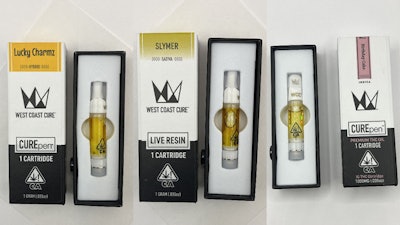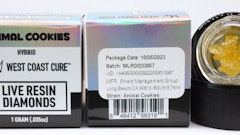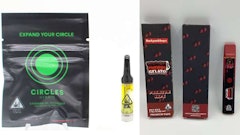
Editor's note: This article was updated at 3:30 p.m. PST on July 5 to reflect additional context from West Coast Cure.
The California Department of Cannabis Control (DCC) issued a consumer advisory July 2 for multiple vape cartridge products, the latest targets among a string of mandatory recalls from the department.
Five West Coast Cure (WCC) products, manufactured under the legal business name Shield Management Group LLC, were recalled due to the presence of chlorfenapyr, a Category I pesticide, according to the DCC.
Category I pesticides are classified as having the most highly acute toxicity levels based on oral, dermal or inhalation toxicity, according to Penn State Extension. The Environmental Protection Agency requires them to have a warning label with the words DANGER and POISON printed in red with a skull and crossbones symbol prominently displayed on the front panel of the package.
“Chlorfenapyr intoxication is characterized by a high fever, rhabdomyolysis and neurologic symptoms that progressively worsen until death,” according to multiple reports cited by the National Institute of Health (NIH). In humans, most patients with chlorfenapyr toxicity died after seven to 20 days, according to a 2015 study published by the NIH.
Chlorfenapyr is not registered for food use in California and, as a Category I pesticide, is banned for use in cannabis cultivation, according to the state’s Department of Pesticide Regulation (CDPR).
“The five recalled products on July 2 are at the beginning of the investigatory process, and the department cannot provide any additional information,” DCC Information Officer Moorea Warren told Cannabis Business Times.
RELATED: California Recalls More Cannabis Products Due to Deadly Pesticide
The same day those products were recalled, WCC issued a press release calling for improved oversight of California's cannabis testing laboratories while also standing behind its own compliance practices.
"First and foremost, we want our customers to know that providing safe, quality products is our highest priority," the released stated. "West Coast Cure sources quality material for our products from vendor partners with whom we have long-standing relationships. We have passing compliance tests from state-licensed laboratories for every one of our products that is sold to consumers. In addition, we do quality control testing with labs before production and packaging. In 2023 alone, West Coast Cure invested nearly $1 million in testing, utilizing multiple licensed laboratories to perform thousands of tests."
The WCC products subject to the July 2 mandatory recalls include:
- Three WCC CUREpen PREMIUM THC OIL vape cartridges sold on or after Sept. 8, 2023, at 202 locations in 33 counties:
- Lemon Cooler: 1-gram THC cartridge (Batch No.: VPPL234379 | UID No.: 1A4060300009222000010379)
- Birthday Cake: 1-gram THC cartridge (Batch No.: VPPL234382 | UID No.: 1A4060300009222000010382)
- Watermelon Sorbet: 1-gram THC cartridge (Batch No.: VPPL234381 | UID No.: 1A4060300009222000010381)
- A single WCC CUREpen vape cartridge sold on or after Sept. 28, 2023, at 216 locations in 33 counties:
- Lucky Charmz: 1-gram cartridge (Batch No.: VPPL234429 | UID No.: 1A4060300009222000011129)
- A single WCC LIVE RESIN vape cartridge sold on or after Sept. 28, 2023, at 73 locations in 27 counties:
- SLYMER: 1-gram cartridge (Batch No.: VRES234436 | UID No.: 1A4060300009222000011136)
“Consumers who may have purchased these West Coast Cure (WCC) vape cartridge products are urged to check their packaging for the UID and batch number,” according to the July 2 DCC notification. “If the numbers match, dispose of the product or return it to the retailer for proper disposal.”
The department encouraged consumers to seek immediate medical attention if they experience symptoms or adverse reactions.
The DCC also issued a mandatory recall June 25 for the CUREpen Premium THC oil 1-gram vape cartridge product “Orange Cookies,” manufactured by Alkhemist DM LLC, due to the presence of chlorfenapyr, according to the department. Licensed dispensaries sold this product on or after Sept. 29, 2023, at 169 locations statewide (Batch No. VPPL234457 | UID No.: 1A4060300036B66000008211).
Specifically, the department has issued 19 mandatory recalls this year. In addition to vape cartridges, these recalls were for flower, pre-rolls and infused pre-rolls with the presence of Aspergillus, a common mold.
The most recent mandatory recalls on July 2 followed a June 14 article published in the Los Angeles Times, “The Dirty Secret of California’s Legal Weed,” that was written in conjunction with Weed Week’s Alex Halperin.
The investigative article “looked into the presence of dangerous, sometimes banned, pesticides in California’s legal weed supply, and how state regulators have been unwilling and/or unable to address them,” Halperin wrote in a June 14 email to subscribers.
On June 15, plaintiff Kayla Esmond’s attorneys filed a class action lawsuit against Shield Management Group (d/b/a WCC) in the Superior Court of California, Orange County, Green Market Report reported.
A California resident, Esmond purchased multiple WCC products since June 2020 that the lawsuit claims “contained unlawful contaminants.” The lawsuit lists 23 products, stating that many of these products contained Category I contaminants chlorfenapyr, paclobutrazol and/or fipronil, and many contained over the allowable limits for lower category contaminants bifenazate, trifloxystrobin, imidacloprid, tebuconazole and myclobutanil.
Imidacloprid, tebuconazole and myclobutanil are on California’s groundwater protection list, according to the CDPR.
“Proper testing would have identified these substances and would have rendered them unfit for sale,” the lawsuit states. “Sadly, now that the practice of lab shopping, and by extension burying safety fails, has become widespread, there is no end in sight, and no place for honest brokers in the marketplace, absent external intervention.”
WCC denied any allegations of lab shopping in its July 2 release.
"We have asked the DCC on several occasions to provide a list of licensed laboratories that they have determined to be better than other labs," the release stated. "In each instance, the DCC responded by saying they would not recommend one lab over another lab. At the end of the day, West Coast Cure is not a testing laboratory, nor are we permitted to be one by California regulations. The system set up by the state requires us to rely on tests conducted by third-party laboratories that have been licensed and certified by the state of California to perform the required tests in accordance with the regulations."
Also, WCC pointed out that the LA Times article appeared to coincide with another industry lawsuit.
"West Coast Cure recently learned of the lawsuit brought by two labs against several other labs, which was also filed on the same day the first article was published by the L.A. Times," the released stated. "The timing, substance and coordination of the media coverage and the lawsuits, as well as the players behind it all, raise serious questions as to whether this is part of a coordinated campaign by two labs to target other labs in the industry in order to eliminate them from the market and seek financial gain."
Four of the 23 product names in the class-action lawsuit matched those later issued mandatory recalls by the DCC. The DCC and/or the recalled product distributor(s) email retail licensees with recalled products in their inventory, providing instructions for proper disposal, according to the department.
Catalyst Cannabis Co., which operates 28 dispensaries in California, received one of those notifications from the DCC last week, according to CEO Elliot Lewis.
“There’s a recall on a West Coast Cure batch from 2023 from the DCC,” Lewis said in a LinkedIn video. “There was a batch recalled from 2023, and 23 of our stores sold it. We’re sold out now. We don’t hold product for that long. We’re all sold out, and we have nothing to recall. But, at that time, going back about nine months, 23 of our stores sold a batch that has now been recalled by the DCC. … This is just me telling the truth. I’m sad about it. But I’d want to know.”
There are 29 licensed testing laboratories in compliance with the DCC’s standard cannabinoid testing methods. In addition to testing for cannabinoid content, these labs also test for foreign material, heavy metals, microbial impurities, mycotoxins, moisture content, residual pesticides, residual solvents and sometimes terpenoids.
The labs must report the test results on a certificate of analysis (COA) and then submit the COA to the DCC and the state’s track-and-trace system provider.
According to the class action lawsuit listing Esmond as the plaintiff on behalf of herself and all others similarly situated, independent testing found multiple instances of unreported Category I contaminants in the products the lawsuit listed.
“Neither consumers nor even dispensaries could be expected to know which products on the shelf disguise contamination, and which do not (consumers and dispensaries are not laboratories, after all),” the lawsuit states. “But the consequence of this fact poses an existential threat for the health of consumers in California.”
The July 2 WCC release stated that the company wants to work with industry leaders and the DCC to create standards, third-party accreditation and other requirements that all laboratories must follow in order to achieve accurate, consistent and verifiable results.
"This is the only way to have fair comparisons and ensure that test results are consistent and accurate in order to re-instill consumer confidence in lab testing," the company stated.
Editorial Director Noelle Skodzinski contributed to this report.


























